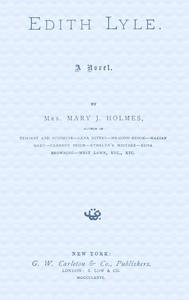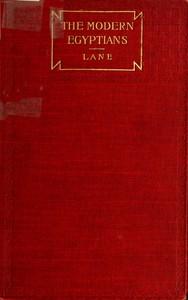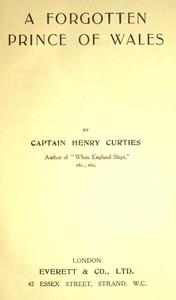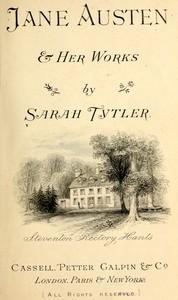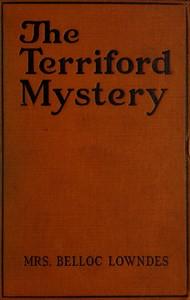|
|
Read this ebook for free! No credit card needed, absolutely nothing to pay.Words: 164425 in 53 pages
This is an ebook sharing website. You can read the uploaded ebooks for free here. No credit cards needed, nothing to pay. If you want to own a digital copy of the ebook, or want to read offline with your favorite ebook-reader, then you can choose to buy and download the ebook. EDITH LYLE. INTRODUCTORY. BY ESTHER OLIVIA ARMSTRONG. As I sit here, this bright autumnal morning, and from the window of my room look out upon the river winding its way to the sea, there falls upon my ears the merry chime of bells from the tower of the old gray church,--wedding-bells they are,--and their echoes float across the water, and up the mountain side, and then die away among the wooded cliffs beyond, where the foliage has just been touched with the October frost, and has here and there a gay trimming of scarlet and gold on its summer dress of green. There is a wedding at St. Luke's to-day, and the bridal party is passing now, and I kiss my hand to the beautiful bride, who flashes a smile at me from those wonderful eyes of hers,--eyes so like in expression to those of the elder lady who sits beside her, and but for whom that wedding at St. Luke's would never have been. They are gone now from my sight, and only the pealing of the bells is heard in the quiet street, and as I muse upon the strange event which has made the people of our town wild with excitement and curiosity, and of which I, perhaps, know quite as much as any one, I ask myself, "Why not write out the story, suppressing names, and dates, and localities, and give it to the world, as a proof that real life is sometimes stranger than fiction." The Schuylers were of Holland descent, and had married and intermarried in England and America, and had in their family a title, it was said, and they boasted of their Dutch blood, and English blood, and American blood, and, like the famous Miss McBride, "were proud of their money and proud of their pride," and proud to be known as "the Schuylers of New York," who had for so many years kept themselves free from anything approaching to plebeianism, and whose wealth and importance had been steadily on the increase since the first English Schuyler left his ancestral halls in Lincolnshire across the sea. But the race was gradually dying out, and the only male member of the direct line in America was Colonel Howard, a proud, reticent man, who, a few years before my story opens, had married Miss Emily Rossiter, a lady fully up to the Schuyler standard of moral and social worth. It was true she brought with her a plain face and a brain not overburdened with ideas, but she added to these the sum of two hundred thousand dollars and an exclusiveness which saw nothing outside her own narrow circle of friends. At the time of her marriage her husband, Colonel Howard Schuyler, who loved the fresh grass and the air from the hills better than brick walls and stony pavements, suggested that they should spend a portion of the summer at his country-seat on the river, but to this the lady would not listen. Hampstead was too quiet. Her elegant laces, and satins, and diamonds, would be sadly out of place in that rustic neighborhood, she thought; and so she went first to Europe, and then, season after season, to Newport and Saratoga, and had a cottage at Nahant, and climbed the White Mountains and the Catskills, and tired herself out in her pursuit of happiness, until, at last, broken in health and spirits, she signified a wish to go to Hampstead, where she could find the rest she needed. And so one April day Colonel Schuyler came up to our little town with a whole army of workmen, who began at once their task of tearing down and rebuilding the old house, which had belonged to the Schuylers so long, and which latterly had been unoccupied and gradually going to decay. The house, which was very large, stood upon an eminence overlooking the town of Hampstead and the river below, and from this fact the place was known as Schuyler Hill, though for years and years not a Schuyler had lived there or manifested the slightest interest in it. There was a time, however, within my mother's memory, when all through the summer months high festival had been held at the old place by the Schuylers, whose graves were now in a little inclosure at the summit of the hill, where the tall evergreens were growing, and where the weather-stained headstones were, with their quaint devices and eulogies of people dead long before I was born. Sometimes on a bright summer afternoon I used to climb over the low railing into this yard, to gather the roses and sweet-brier which grew there in such profusion, and, seated on the grass, I would muse upon the dead folk who slept below, and wish so much for a return of the days of which my mother had told me, when the great house was full of high-born people, who made the neighborhood so gay, and whose revellings were sometimes prolonged far into the night. At last, however, there was a prospect of those days coming back again, and the whole town was alive with wonder and curiosity when it was known that not only was the old house to give way to a new and elegant modern structure, but that the family was really coming there to live a good portion of the year. Hampstead, which had slept so long, was alive now. Property went up, and the people began to talk of a bank, and a new hotel, and sent a petition that the express trains from Albany should stop there, instead of thundering by on the wings of the wind with a snort and a scream, which I thought was tantalizing and impertinent in the extreme. Great, too, was the excitement and interest with regard to the new house, which, under swift and efficient workmen, grew so rapidly that, early in June, the framework of the tower could be seen above the tree-tops, and was watched eagerly by the curious villagers. "Lady Emily," as her English maid always called her, came up one day to see the place and give some directions with regard to certain rooms intended expressly for herself, and with her came little Godfrey, her only son, a brown-eyed, sweet-faced boy not quite six years old. I remember just how they looked as they drove through the town in their open barouche, Lady Emily in her jaunty bonnet, which I thought too small and young for her pale, faded face, and little Godfrey in his velvet suit, with his long hair curling on his neck. He was a pleasant, sociable child, and soon made the acquaintance of all the workmen, but was best pleased with Abelard Lyle, the young Englishman who was employed upon the tower, and who at night, when his work was done, made wonderful wagons and carts for the pretty little lad. All day long Godfrey played about the building, and sometimes climbed the highest possible point, and stood watching the men at their work below. Especially was he delighted with the tower where Abelard was; and one morning, the third after his arrival at Hampstead, he mounted to a timber above the young man's head, where he stood waving his cap and hurrahing to his mother, who was driving leisurely about the grounds in her pony phaeton. She saw him, and with a frantic gesture of her hand motioned him to come down, while Abelard, too, called aloud to him and warned him of his danger. How it happened Godfrey never could explain. He only knew that he stepped backward and fell, that Abelard caught him by the arm and threw him with a desperate effort upon a narrow platform, where he lay unharmed, while his brave deliverer lay on the rubbish far below, a crushed, bleeding thing! Only a thing now,--no life, no motion, no soul, for that had gone to God; and they took the limp, insensible object and laid it upon the grass, which was wet with the blood pouring from the deep wound upon the temple where a sharp stone had struck. Trembling with fear, little Godfrey came down the long ladders and across the piles of boards to the mutilated form upon the grass; and young as he was, he never forgot the look of the pale, dead face upturned to the summer sun. "Oh father!" he cried, as Colonel Schuyler came up, "he catched me and throwd me onto the board, and tried to hold on himself, but couldn't; and now he's dead, and I liked him so much; what shall we do?" They could do nothing but bear the poor youth to his boarding place near by, where they washed the blood and dirt from his stained face and matted hair, and then began to ask where he came from, and who his relatives were, if he had any. He was an English boy, and had not been long in the country, some one said; but nobody could tell anything definite concerning him or his friends, until there stepped from the crowd an elderly, dignified woman, whom the people recognized as Mrs. Fordham, a comparative stranger to them all. She, too, was English, and she knew the youth who had lost his own life in his efforts to save another. She had known him on the ship, she said. He had come to America in the same vessel with herself a few months before. If they liked, they could take him to her house and bury him from there, as she was the only acquaintance he seemed to have, and he had sometimes called upon her since coming to Hampstead. To this proposition the matron of the boarding-house assented eagerly. A dead body and a funeral were not at all to her taste, and besides she was not sure as to the pay she might receive for her trouble, and she thanked Mrs. Fordham so cordially, and evinced so strong a desire to be rid of her late boarder, that the matter was arranged at once, and Mrs. Fordham started for home to make ready for the dead man, who had been there only the night before, and had left her so full of life, and health, and hope for the untried future. Of Mrs. Fordham but little was known in Hampstead at that time. She had only been with us since the first of May, and soon after her coming she had said that if she could not have the best society she would prefer to have none; and as the so-called best society was a little shy of strangers and foreigners, she was left mostly to herself, and was seldom seen except at church, where she was a regular attendant, and where her daughter, a young girl of fifteen or more, attracted much attention by the exceeding beauty of her face, and the delicate refinement of her manner. Subsequently we learned more of her history, which was as follows: Free books android app tbrJar TBR JAR Read Free books online gutenberg More posts by @FreeBooks
: An account of the manners and customs of the modern Egyptians by Lane Edward William - Egypt Social life and customs@FreeBooksThu 08 Jun, 2023
|
Terms of Use Stock Market News! © gutenberg.org.in2025 All Rights reserved.

